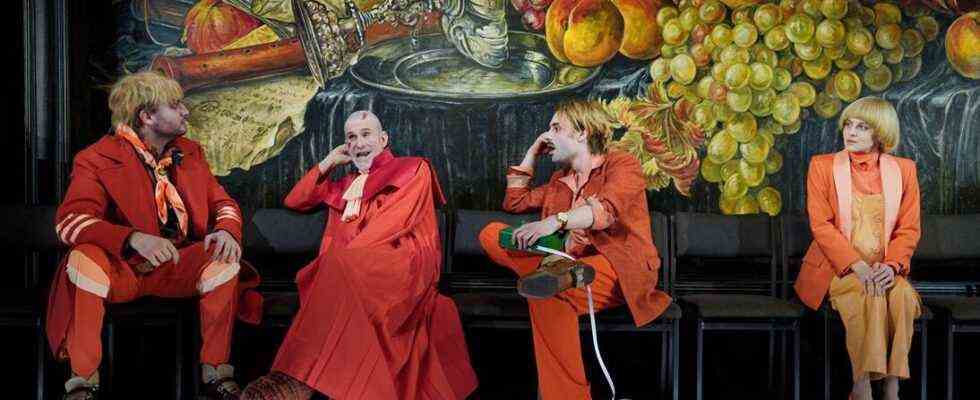Even if Angela Merkel is absolutely silent when asked what she plans to do after the end of her term of office, at least one can reveal this much now: She goes to the theater. Nice for the stages and their audience – with the ex-Chancellor in the stalls, going to the theater feels a little more important. The former Chancellor shows good taste, at least she is lucky with the choice of pieces. The premiere of Kleist’s “The Broken Krug”, which she presented on German Theater Berlin looks at is an extremely fresh, funny, light-footed classic staging. It provides something that one should not necessarily expect from classic productions, especially from classics that are cut up in the meat grinder of the director’s theater: It provides pleasure.
The themes of the play, from the abuse of power and sexism to the undermining of the rule of law, should sound familiar to Merkel. But in such fast-paced, at least ambiguous, if necessary also shoddy puns, in such flexible, rhythmic verses, performed by cheerful, slightly over-the-top linguists, you have probably rarely encountered her in her previous work environment. The director Anne Lenk has given the Deutsches Theater two of the most successful and successful performances of the last few years with her form-assured and playful productions of Schiller’s “Maria Stuart” and Molière’s “Der Menschenfeind”, which are always focused on the actors and nuanced language treatment.
Ulrich Matthes plays the village judge Adam nice and dry as a kind of clown
Your Kleist comedy continues this successful series with the greatest joy in playing. Because it’s not about fidgeting and certainly not about naturalistic milieu painting, Lenk simply puts the players in a row on the front stage in pop-alienated historical costumes shimmering in many bright orange tones (Sibylle Wallum), after all we are here in a courtroom. Behind them, at full height and width of the stage, shines a reproduction of a Dutch still life from the 17th century, which must suffice as a period color (stage: Judith Oswald).
Ulrich Matthes plays the devious hunter and village judge Adam nice and dry as a kind of clown, someone who pretends to be more stupid than he is and with relish the vowels of the Kleist verses stretched and dismantled. To consider him a devil would be an overestimation despite clubfoot, bloody allusions to the horns and a certain nefariousness. The leisurely corruption and perversion of the law are a cherished habit, not a demonic act. He abuses his judicial office with such a relaxed, self-evident fact that he doesn’t even understand that everything over red wine and sausage cannot be sorted out by hand with the court counselor on a control visit (Lorena Handschin).
The fact that the production turns Kleist’s judicial councilor into a woman has to be understood as a statement: Here the sexually assaulted Adam is being tried. Adam’s clerk of course lurks with a loyal, intriguing instinct for his chance to saw off the old man, but until then he maintains the bedroom look and his beau hairstyle as if he were the older brother of Oscar Wilde (Jeremy Mockridge). Franziska Machens as the plaintiff Marthe Rull demonstrates what a guncock with a healthy thirst for red wine is: The good woman is not impressed by any dish in the world, she prefers to talk about everything and everything in the ground. Traditionally, her daughter, whom the village judge wants to blackmail into sexual favors, is a figure of naive innocence. Fortunately, there is no question of that with Lisa Hrdina, who instead opts for an appearance that equips her character with oomph, wisdom and self-confidence – the virgin sacrifice can cede.

